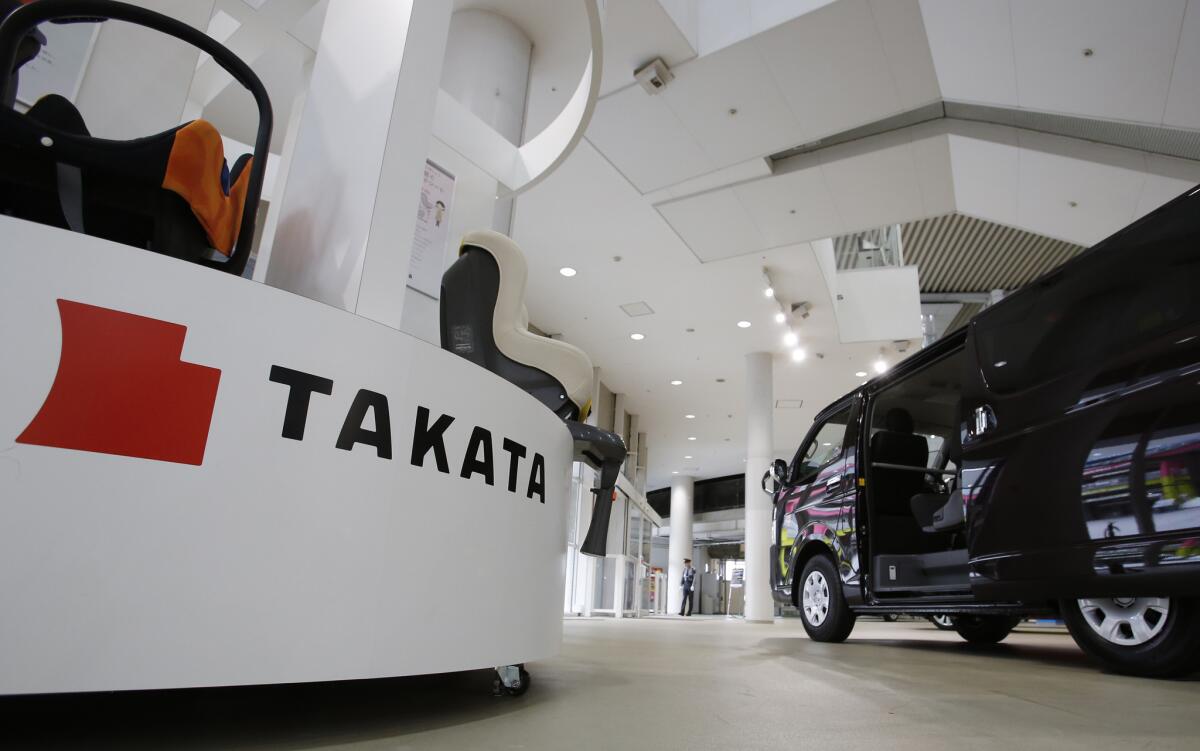Exploding air bags: Takata recall now totals 34 million vehicles

Takata Corp. child seats are displayed at a Toyota Motor Corp. showroom in Tokyo on Nov. 6, 2014.
Japanese auto supplier Takata Corp. on Tuesday declared that air bags in nearly 34 million vehicles are defective, making it the largest recall of automobiles in history and among the biggest of any U.S. consumer product.
The Tuesday announcement reverberated through the auto industry, which has come under increasingly harsh scrutiny from federal safety regulators. It marks a victory for the National Highway Traffic Safety Administration, which has pressed Takata for such action since last fall.
“Lives are at stake,” said Transportation Secretary Anthony Foxx. “That is why we are doing what we are doing today.”
At least six people have been killed by the air bags, and dozens more have been injured.
The air bag recall doubles the size of an ongoing recall of Takata air bags initiated by automakers and extends to vehicles manufactured by BMW, Chrysler, Daimler Trucks, Ford, General Motors, Honda, Mazda, Mitsubishi, Nissan, Subaru and Toyota. It exceeds the previous record of 21 million Ford vehicles that were recalled in 1981 for a faulty parking gear.
Investigators believe that the problem results from faulty fabrication of chemical-propellant wafers stacked inside the inflators at Takata factories in Moses Lake, Wash., and Monclova, Mexico. The problem can cause a metal canister in the air bag system to explode, spraying shrapnel into the passenger cabin.
The precise cause of the defect continues to elude regulators and the auto industry, however. A similar problem in parts produced by Takata cropped up previously in driver’s-side air bags. The problem appears to occur most frequently in hot, humid climates, often in low-speed collisions when an air bag is not normally expected to deploy.
U.S. officials said they needed to protect public safety.
The auto industry is seeing increasingly large recalls as manufacturers share parts across their own models and use components from the same suppliers. NHTSA said there were 803 vehicle recalls last year involving 63.9 million vehicles. Last year’s tally included two of the 10 largest vehicle recalls in history and involved double the record number of cars set in 2004.
This recall could expand as NHTSA officials work with Takata and auto manufacturers to identify exactly which vehicles have the defective air bags.
“We intend to make sure that at the end of this process there is a safe air bag in every vehicle,” Mark Rosekind, the NHTSA administrator, said.
This year federal safety regulators levied fines of $14,000 a day on Takata for not cooperating with the Department of Transportation’s investigation into the company’s air bags. The fines have now topped $1 million.
Regulators said Takata flooded the agency with 2.4 million pages of documents but failed to provide any type of index or guide, which is required by law and vital for a speedy investigation.
Takata said Tuesday that it had signed a consent order with NHTSA in which it agreed to cooperate fully with regulators investigating the defective air bags. NHTSA agreed to stop levying the daily fines after Takata signed the consent order.
The agreement “presents a clear path forward to advancing safety and restoring the trust of automakers and the driving public,” said Shigehisa Takada, chief executive of Takata.
The air bag “debacle” is startling because of the enormous number of vehicles involved from so many auto manufacturers, said Michelle Krebs, an analyst with car shopping company Autotrader.
Tuesday’s action underscores the stiffened resolve of safety regulators, who have come under fire in other recent auto safety scandals for not acting quickly enough to protect the public.
“This is unprecedented in the auto industry,” Krebs said. “Automakers and suppliers should take heed.”
NHTSA’s effort to force the Takata recall was applauded in Congress.
“Folks shouldn’t have to drive around wondering if their air bag is going to explode in their face,” said Sen. Bill Nelson (D-Fla.), who is part of a congressional probe into the defective air bags. “Let’s hope Takata’s admissions today tell us the whole story.”
But NHTSA is partly responsible for the problem continuing for more than a decade, said Clarence Ditlow, executive director of the Center of Auto Safety.
“NHTSA didn’t pay enough attention to Takata,” Ditlow said.
The agency mistakenly believed the problem was a small design issue, Ditlow said. In reality, he said, Takata had picked the wrong chemical formula for the propellent in the inflators, he said. Replacement inflators use a different formula.
“It was inherently unstable and should have been changed much earlier,” Ditlow said.
Now there aren’t enough replacement modules to go around, so NHTSA will set a staggered repair timeline that will prioritize car models and regions where the repairs are most urgent.
Consumers who believe their vehicles may be affected can check the regulator’s website and get more information. Consumers might have to check several times as more vehicles are added to the recall list.
It could take “some years” before the recall is complete, and a second recall may be required if and when federal regulators pinpoint the cause of the problem, Rosekind said.
Automakers and safety officials have had trouble getting cars with the faulty air bags fixed because of a shortage of replacement parts. Moreover, many of the vehicles are older and have had multiple owners. That makes it hard to reach the current drivers.
“It’s fair to say this is probably the most complex consumer safety recall in U.S. history,” Foxx said.
jerry.hirsch@latimes.com
jim.puzzanghera@latimes.com








